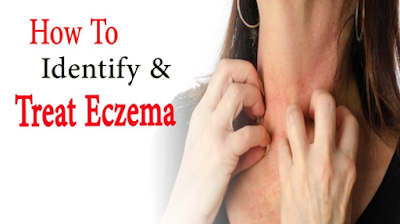There is no universal or a particular cause behind triggering of eczema. Medical research and a number of doctors believe that eczema is hereditary disease and is contained in the genes of the person. Generally eczema is a severe form of skin allergy that is caused due to over-sensitivity of the skin also known as atopy. Atopic Eczema is often associated with hay fever and asthma. If a person comes in direct contact with the things that irritates the skin he or she may experience eczema as a result. There are loads of substances that trigger allergic reactions in a number of people such as detergents, diesel oil, soaps, body sprays, pollen grains, synthetic cleansers, chemical substances and other sort of rough substances. Certain substances add fuel to the fire by flaring up your existing eczema. These substances include poisonous ivy, nickel, cosmetics and low grade plastic and rubber materials.
Infants can also get affected from eczema. Eczema in babies is called infantile eczema. In babies eczema is usually caused by the inflammation of the scalp. Adults also suffer from different types of eczema such as legs eczema, face eczema etc. Legs eczema is also called as gravitational eczema and is caused due to varicose veins. Face eczema is a result of too much perspiration on the face. Different types of eczemas are classified on the bases of their causes and the [part of body they affect. Classified forms of eczema are Atopic Eczema, Nummular Eczema, Varicose Dermatitis, Dishydrotic Eczema and Seborrhoeic Dermatitis. Sometimes internal body factors are responsible for eczema instead of external factors. A person having a weak immune system may suffer from eczema. Negative emotions, stress and depression also lead to eczema in some persons.
There are a number of symptoms of eczema. Some of these symptoms are visible while only the people suffering from eczema feel other symptoms. There is scaling, drying and itching of the skin during eczema. The skin of the person becomes red and he or she may feel stubborn irritation. Eczema may result in breaking of the skin cells and as a result there is formation of blisters on the surface of the skin. The epidermis or the upper layer of the skin becomes thick and scaly due to chronic eczema.
Eczema is not a contagious disease however it is a source of constant embarrassment and humiliation for the person suffering from it. A person feels constant awkwardness if he or she is suffering from eczema on face. There are different methods to treat eczema. The golden rule to treat eczema is to keep your skin as moisturized as possible. Apply medicated moisturizers from time to time in order to keep your skin moist. Eat a balanced and healthy diet and avoid direct contact with the substances you may think are allergic for your skin.
Infants can also get affected from eczema. Eczema in babies is called infantile eczema. In babies eczema is usually caused by the inflammation of the scalp. Adults also suffer from different types of eczema such as legs eczema, face eczema etc. Legs eczema is also called as gravitational eczema and is caused due to varicose veins. Face eczema is a result of too much perspiration on the face. Different types of eczemas are classified on the bases of their causes and the [part of body they affect. Classified forms of eczema are Atopic Eczema, Nummular Eczema, Varicose Dermatitis, Dishydrotic Eczema and Seborrhoeic Dermatitis. Sometimes internal body factors are responsible for eczema instead of external factors. A person having a weak immune system may suffer from eczema. Negative emotions, stress and depression also lead to eczema in some persons.
There are a number of symptoms of eczema. Some of these symptoms are visible while only the people suffering from eczema feel other symptoms. There is scaling, drying and itching of the skin during eczema. The skin of the person becomes red and he or she may feel stubborn irritation. Eczema may result in breaking of the skin cells and as a result there is formation of blisters on the surface of the skin. The epidermis or the upper layer of the skin becomes thick and scaly due to chronic eczema.
Eczema is not a contagious disease however it is a source of constant embarrassment and humiliation for the person suffering from it. A person feels constant awkwardness if he or she is suffering from eczema on face. There are different methods to treat eczema. The golden rule to treat eczema is to keep your skin as moisturized as possible. Apply medicated moisturizers from time to time in order to keep your skin moist. Eat a balanced and healthy diet and avoid direct contact with the substances you may think are allergic for your skin.

No comments:
Post a Comment